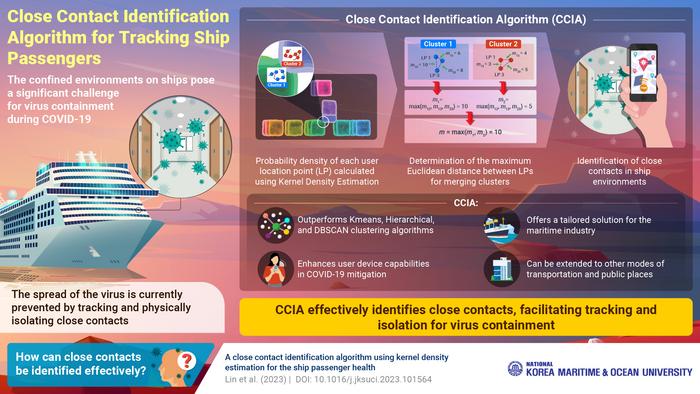The COVID-19 pandemic has drastically affected human lives and the global economy. In particular, cruise ship companies around the world are among the worst hit industries, with ships becoming a hotbed of viral infection owing to their confined environment. With the economy slowly recovering in the post COVID-19 period, ship companies hope to return to normal operations by adopting a sustainable management model that prioritizes the health of ship passengers.

Credit: Professor Jooyoung Son from Korea Maritime and Ocean University
The COVID-19 pandemic has drastically affected human lives and the global economy. In particular, cruise ship companies around the world are among the worst hit industries, with ships becoming a hotbed of viral infection owing to their confined environment. With the economy slowly recovering in the post COVID-19 period, ship companies hope to return to normal operations by adopting a sustainable management model that prioritizes the health of ship passengers.
However, the close-quartered environment in ships pose a significant challenge for virus containment. Tracking and physical isolation of infected passengers remains the standard protocol for preventing the spread of virus. Unfortunately, an effective identification of individuals in close contacts, who have potentially been exposed to the virus and can spread it, remains challenging.
Now, Mr. Qianfeng Lin, a Ph.D. candidate at the Department of Computer Engineering at Korea Maritime and Ocean University (KMOU), and Professor Jooyoung Son from the Division of Marine IT Engineering at KMOU have developed a novel close contact identification algorithm (CCIA) that enables an accurate identification of close contacts. Their work was made available online on 25 April 2023 and published in Volume 35, Issue 6 of the Journal of King Saud University – Computer and Information Sciences in 01 June 2023.
“Through our research, we aim to provide a technology-driven solution to this challenge and contribute to the health and safety of the maritime industry,” explains Mr. Lin.
CCIA utilizes a statistical method, called “Kernel Density Estimation,” to calculate the probability density of each user location point. This density is then used as the weight of each user location point. The center of these location points, which form a cluster, are then calculated based on each location point and its corresponding weight. Next, CCIA determines the maximum Euclidean distance between the location points in each user cluster, denoted m. For any two clusters in which the Euclidean distance between their centers is less than m, CCIA merges them. As a result, the number of clusters that remain in the end can be used to accurately identify close contacts, facilitating their effective tracking and isolation within ship environments.
The researchers next conducted close contact tracing experiments on the HANNARA ship, a training vessel for KMOU. To their delight, they found that CCIA outperformed conventional clustering algorithms, such as Kmeans, Hierarchical, and DBSCAN, which cannot calculate the probability density of each location point. Moreover, although CCIA has been primarily developed to offer a customized solution to the maritime industry, it could potentially be applied to other modes of transportation and public spaces as well. Furthermore, CCIA also enhances the capabilities of user devices such as smartphones in mitigating the spread of COVID-19.
“Amid the current global health crisis, this study presents a technology-driven method that can effectively track and isolate potential virus spreaders, contributing to halting further spread of the virus. In effect, we have developed a general methodology for preventing future infectious disease outbreaks,” points out an optimistic Prof. Son.
Let us hope that this work will help ensure the health and safety of passengers opting for sea travel, bolstering public confidence in the maritime sector.
***
Reference
DOI: https://doi.org/10.1016/j.jksuci.2023.101564
About National Korea Maritime & Ocean University
South Korea’s most prestigious university for maritime studies, transportation science and engineering, the National Korea Maritime & Ocean University is located on an island in Busan. The university was established in 1945 and since then has merged with other universities to currently being the only post-secondary institution that specializes in maritime sciences and engineering. It has four colleges that offer both undergraduate and graduate courses.
Website: http://www.kmou.ac.kr/english/main.do
About the authors
Qianfeng Lin, a Ph.D. candidate at Korea Maritime and Ocean University (KMOU), has been studying marine IT and computer engineering at Korea Maritime and Ocean University for about four and a half years. His research is driven by deep learning and maritime intelligence, offering innovative solutions for in-ship localization, especially amidst COVID-19 challenges.
Professor Jooyoung Son received his Bachelor of Science degree from the Seoul National University, Seoul, Korea in 1985, and his Masters and Ph.D. degrees in computer engineering from there in 1993 and 1997, respectively. He was a senior researcher at Media Communication Laboratory at LG Electronics between 1985 and 1998. He is currently affiliated with KMOU. His work focuses on in-ship localization and maritime telecommunication systems, pioneering technologies for providing pivotal strategies for the maritime industry and bolstering the security and safety of the people working at sea.
Journal
Journal of King Saud University – Computer and Information Sciences
DOI
10.1016/j.jksuci.2023.101564
Method of Research
Computational simulation/modeling
Subject of Research
Not applicable
Article Title
A close contact identification algorithm using kernel density estimation for the ship passenger health
Article Publication Date
1-Jun-2023
COI Statement
The authors declare that they have no competing interests




